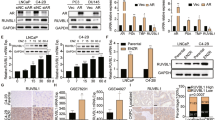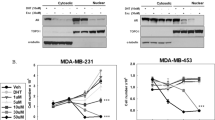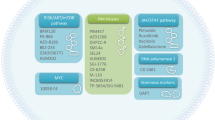Abstract
Aurora B kinase (AURKB) and epidermal growth factor receptor 1 (EGFR) belong to serine/threonine and tyrosine kinase family of proteins. Both these kinases are found to overexpress in a large number of epithelial cancers, including hormonal refractory prostate cancer. In this communication, we present evidence for down-regulated expression of AURKB and EGFR, either alone or in combination, in prostate cancer cells. The results show that AURKB and EGFR were efficiently down-regulated in a dose-dependent manner. AURKB and EGFR siRNA in combination have shown enhanced therapeutic effect by inhibiting PC3 cell proliferation and inducing apoptosis in vitro, whereas androgen-dependent cancer cells LNCaP remain unaffected correlating the endogenous expression levels. Knockdown of AURKB and EGFR individually resulted in inhibition of prostate tumor growth in athymic nude mice and their combined knockdown resulted in tumor regression in which 40% of the treated mice were found to be tumor free, implicating the potential therapeutic benefits of AURKB–EGFR combination therapy.
This is a preview of subscription content, access via your institution
Access options
Subscribe to this journal
Receive 12 print issues and online access
$259.00 per year
only $21.58 per issue
Buy this article
- Purchase on Springer Link
- Instant access to full article PDF
Prices may be subject to local taxes which are calculated during checkout







Similar content being viewed by others
References
Harris WP, Mostaghel EA, Nelson PS, Montgomery B . Androgen deprivation therapy: progress in understanding mechanisms of resistance and optimizing androgen depletion. Nature 2009; 6: 76–85.
Lorenzo G, Tortora G, Armiento FP, Rosa G, Staibano S, Autorino R et al. Expression of epidermal growth factor receptor correlates with disease relapse and progression to androgen-independence in human prostate cancer. Clin Cancer Res 2002; 8: 3438–3444.
Tannock IF, Osoba D, Stockler MR, Ernst DS, Neville AJ, Moore MJ et al. Chemotherapy with mitoxantrone plus prednisone or prednisone alone for symptomatic hormone-resistant prostate cancer: a Canadian randomized trial with palliative end points. J Clin Oncol 1996; 17: 1654–1663.
Pihan GA, Wallace J, Zhou Y, Doxsey SJ . Centrosome abnormalities and chromosome instability occur together in pre-invasive carcinomas. Cancer Res 2003; 63: 1398–1404.
Fu J, Bian M, Jiang Q, Zhang C . Roles of Aurora kinases in mitosis and tumorigenesis. Mol Cancer Res 2007; 5: 1–10.
Lee ECY, Frolov A, Li R, Ayala G, Greenberg NM . Targeting aurora kinases for the treatment of prostate cancer. Cancer Res 2006; 66: 4996–5002.
Tatsuka M, Katayama H, Ota T, Tanaka T, Odashima S, Suzuki F et al. Multinuclearity and increased ploidy caused by overexpression of the aurora- and Ipl1-like midbody-associated protein mitotic kinase in human cancer cells. Cancer Res 1998; 58: 4811–4816.
Chieffi P, Cozzolino L, Kisslinger A, Libertini S, Staibano S, Mansueto G et al. Aurora B expression directly correlates with prostate cancer malignancy and influence prostate cell proliferation. Prostate 2006; 66: 326–333.
Di Lorenzo G, Tortora G, D’Armiento FP, De Rosa G, Staibano S, Autorino R et al. Expression of epidermal growth factor receptor correlates with disease relapse and progression to androgen-independence in human prostate cancer. Clin Cancer Res 2002; 8: 3438–3444.
Sirotnak FM, Zakowski MF, Miller VA, Scher HI, Kris MG . Efficacy of cytotoxic agents against human tumor xenografts is markedly enhanced by coadministration of ZD1839 (Iressa), an inhibitor of EGFR tyrosine kinase. Clin Cancer Res 2000; 6: 4885–4892.
Marciniak DJ, Rishi AK, Sarkar FH, Majumdar APN . Epidermal growth factor receptor-related peptide inhibits growth of PC-3 prostate cancer cells. Mol Cancer Ther 2004; 3: 1615–1621.
Zhang Y, Zhang Y-F, Bryant J, Charles A, Boado RJ, Pardridge WM . Intravenous RNA interference gene therapy targeting the human epidermal growth factor receptor prolongs survival in intracranial brain cancer. Clin Cancer Res 2004; 10: 3667–3677.
Wilkinson RW, Odedra R, Heaton SP, Wedge SR, Keen NJ, Crafter C et al. AZD1152, a selective inhibitor of Aurora B kinase, inhibits human tumor xenograft growth by inducing apoptosis. Clin Cancer Res 2007; 13: 3682–3688.
Woodburn JR . The epidermal growth factor receptor and it's inhibition in cancer therapy. Pharmacol Ther 1999; 82: 241–250.
Nozawa H, Tadakuma T, Ono T, Sato M, Hiroi S, Masumoto K et al. Small interfering RNA targeting epidermal growth factor receptor enhances chemosensitivity to cisplatin, 5-fluorouracil and docetaxel in head and neck squamous cell carcinoma. Cancer Sci 2006; 97: 1115–1124.
Salomon DS, Brandt R, Ciardiello F, Normanno N . Epidermal growthfactor-related peptides and their receptors in human malignancies. Crit Rev Oncol Hematol 1995; 19: 183–232.
Grunwald V, Hidalgo M . Developing inhibitors of the epidermal growth factor receptor for cancer treatment. J Natl Cancer Inst 2003; 95: 851–867.
Ritter CA, Arteago CL . The epidermal growth factor receptor-tyrosine kinase: a promising therapeutic target in solid tumors. Semin Oncol 2003; 30: 3–11.
Weihua Z, Tsan R, Huang W-C, Wu Q, Chiu C-H, Fidler IJ et al. Survival of cancer cells is maintained by EGFR independent of its kinase activity. Cancer Cell 2008; 13: 385–393.
Broxterman HJ, Georgopapadakou NH . Anticancer therapeutics: ‘addictive’ targets, multi-targeted drugs, new drug combinations. Drug Resist Updat 2005; 8: 183–197.
Jackson JR, Patrick DR, Dar MM, Huang PS . Targeted anti-mitotic therapies: can we improve on tubulin agents? Nat Rev Cancer 2007; 7: 107–117.
Zimmermann M, Zouhair A, Azria D, Ozsahin M . The epidermal growth factor receptor (EGFR) in head and neck cancer: its role and treatment implications. Radiat Oncol 2006; 1: 11.
Kent LL, Hull-Campbell NE, Lau T, Wu JC, Thomson SA, Nori M . Characterization of novel inhibitors of cyclin-dependent kinases. Biochem Biophys Res Commun 1999; 260: 768–774.
Zhao L, Wientjes MG, Au JL-S . Evaluation of combination chemotherapy: integration of nonlinear regression, curve shift, isobologram, and combination index analyses. Clin Cancer Res 2004; 10: 7994–8004.
Srikantan V, Valladres M, Rhim JS, Moul JW, Srivastava S . HEPSIN inhibits cell growth/invasion in prostate cancer cells. Cancer Res 2002; 62: 6812–6816.
Mastronardi L, Guiducci A, Puzzilli F . Lack of correlation between Ki-67 labelling index and tumor size of anterior pituitary adenomas. BMC Cancer 2001; 1: 12.
Acknowledgements
We gratefully acknowledge the encouragement and support of Reliance Life Sciences Pvt Ltd, in carrying out the research work. We also thank Dr Rajesh Korde MD (Pathology) for his help in evaluating immunohistopathology slides and Dr Dhananjaya Saranath, PhD, Research Director, Molecular Medicine Group, Reliance Life Sciences Pvt Ltd. for her technical inputs.
Author information
Authors and Affiliations
Corresponding author
Additional information
Supplementary Information accompanies the paper on Gene Therapy website (http://www.nature.com/gt)
Supplementary information
Rights and permissions
About this article
Cite this article
Addepalli, M., Ray, K., Kumar, B. et al. RNAi-mediated knockdown of AURKB and EGFR shows enhanced therapeutic efficacy in prostate tumor regression. Gene Ther 17, 352–359 (2010). https://doi.org/10.1038/gt.2009.155
Received:
Revised:
Accepted:
Published:
Issue Date:
DOI: https://doi.org/10.1038/gt.2009.155
Keywords
This article is cited by
-
Role of aurora kinase B in regulating resistance to paclitaxel in breast cancer cells
Human Cell (2022)
-
Let-7b attenuates cisplatin resistance and tumor growth in gastric cancer by targeting AURKB
Cancer Gene Therapy (2018)
-
Inhibition of pulmonary cancer progression by epidermal growth factor receptor-targeted transfection with Bcl-2 and survivin siRNAs
Cancer Gene Therapy (2015)
-
Large-scale RNA-Seq Transcriptome Analysis of 4043 Cancers and 548 Normal Tissue Controls across 12 TCGA Cancer Types
Scientific Reports (2015)
-
Systemic Delivery of siRNA via LCP Nanoparticle Efficiently Inhibits Lung Metastasis
Molecular Therapy (2012)



